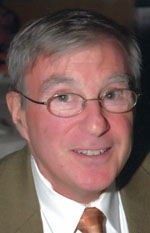Increasing Wholeness: Jewish Wisdom & Guided Meditations to Strengthen & Calm Body, Heart, Mind, & Soul by Rabbi Elie Kaplan Spitz, Jewish Lights Publishing, Woodstock, Vermont; ISBN 978-1-58023-823-6 ©2015, $19.99, p. 151, plus notes
By Fred Reiss, Ed.D.

WINCHESTER, California — The expression “wholeness is peace” might be considered an aphorism in English, but it is definitely a Hebrew pun—“shlēmut hē shalom”—as both Hebrew words for “wholeness” and for “peace” derive from the same three-letter root. This pun, in fact, appears in the Hebrew Bible, whose verse, Genesis 33:18 can be translated as “And Jacob came in peace to the city of Shechem;” or “And Jacob came whole to the city of Shechem.” Rashi, the eleventh century renowned French rabbi and biblical commentator, said that Jacob arrived in Shechem whole, perfect, and unimpaired: unimpaired in health, whole in his possessions, and perfect in faith.
Rabbi Elie Spitz, spiritual leader of Congregation B’nai Israel, Tustin, California, and author of Increasing Wholeness, through stories, prose, references to sacred Jewish texts, and a series of simple, yet powerful, guided meditations running through the book, invites individuals to fill in the gaps of personal inadequacies by garnering a thoughtful, inner calm. Wholeness to Rabbi Spitz means “a fuller sense of awareness of your inner life and greater integration and strengthening in the four dimensions of self.” The four dimensions are physical, emotional, intellectual, and intuitive, which are covered in chapters entitled: Body, Heart, Mind, and Spirit.
Increasing Wholeness, which stresses that everyone struggles with incompleteness, perhaps in areas involving love and closeness, tragedy and pain, and fear and anxiety, offers comfort and guidance by telling of the uniqueness of each individual and presenting alternative thoughts and actions. Going beyond these four dimensions by recognizing that inner peace also requires reaching out beyond oneself, in a chapter entitled “Hand,” Spitz asks the reader to consider becoming part of something greater than him/herself, suggesting that filling in a portion of missing wholeness can be achieved through serving “with goodness on behalf of God,” by giving to others. He concludes with the suggestion that each individual must work toward acquiring and maintaining a state of personal equilibrium, achievable through guided meditation, spirituality and prayer, and serving others.
As a long-time rabbi, Spitz has vicariously participated in the life-cycle events of his congregants and personally stood by them at their most vulnerable moments. Everyone—rich and poor; young and old, male and female— is incomplete and as a symbol for humanity’s frailty, he notes that “even children raised by stable parents in safe neighborhoods worry about monsters under the bed.” Increasing Wholeness is an easy to read; yet impressively presented guidebook, allowing individuals to work toward piecing together their incomplete inner child and making that child whole.
*
Dr. Fred Reiss is a retired public and Hebrew school teacher and administrator. He is the author of The Standard Guide to the Jewish and Civil Calendars; Ancient Secrets of Creation: Sepher Yetzira, the Book that Started Kabbalah, Revealed; and a fiction book, Reclaiming the Messiah. The author can be reached through his website, fred.reiss@sdjewishworld.com.